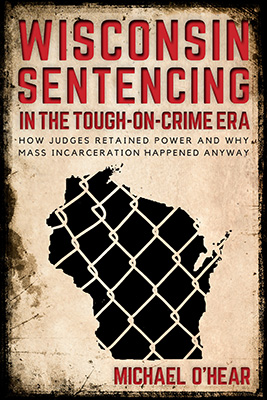Disputing the Causes of Racial Disparity in Incarceration Rates
 Will Kramer’s review of Michael O’Hear’s Wisconsin Sentencing in the Tough-on-Crime Era (Shelf Life, Wisconsin Lawyer, January 2017) was unfair to O’Hear in at least one respect. Kramer quotes O’Hear as saying that racial disparity in incarceration rates “does not necessarily prove that racism” is a cause of mass incarceration because “elevated rates of black imprisonment could conceivably result from higher rates of offending.” Kramer then disparages this hypothesis as “disproven and patently offensive.” That characterization is unarguably at least half wrong.
Will Kramer’s review of Michael O’Hear’s Wisconsin Sentencing in the Tough-on-Crime Era (Shelf Life, Wisconsin Lawyer, January 2017) was unfair to O’Hear in at least one respect. Kramer quotes O’Hear as saying that racial disparity in incarceration rates “does not necessarily prove that racism” is a cause of mass incarceration because “elevated rates of black imprisonment could conceivably result from higher rates of offending.” Kramer then disparages this hypothesis as “disproven and patently offensive.” That characterization is unarguably at least half wrong.
In his critically acclaimed 2016 book The Rise and Fall of Violent Crime in America (Encounter Books, New York/London 2016) (hereinafter, “Rise and Fall”), CUNY Emeritus Professor of Criminal Justice Barry Latzer summarizes voluminous data suggesting that “the bulk of [racial] disproportion [in incarceration rates] is a consequence of the differential involvement by blacks in the most serious kinds of violent crimes, like homicide and robbery.” (“Rise and Fall” at 234, citing and quoting from Alfred Blumstein, “Racial Disproportionality of U.S. Prison Populations Revisited,” Colo. L. Rev. 64 (1993): 759). These data reflect not only arrest and conviction rates, which could hypothetically be distorted by institutional, implicit, or systemic bias, but also comprehensive victim surveys. Given the overwhelmingly intra-racial incidence of violent crime, respondent bias in victim surveys is not a plausible explanation for the results.
These analyses may be disputed (although Kramer neither acknowledges the authority supporting O’Hear’s hypothesis nor references any contrary authority), but there is a difference between disputing something and disproving it. These data do not definitively negate systemic bias as a material factor in racial incarceration differentials – the correlation-isn’t-causation sword cuts both ways – but O’Hear didn’t say that they did. Far from being “disproven,” O’Hear’s carefully qualified and explicitly contingent hypothesis enjoys robust support in highly qualified scholarship and in empirical data. The scholarly analysis and the factual foundation for it could reasonably offend only those who are uncomfortable when empirical data clash with a preconceived narrative that is dogmatically asserted but incompletely investigated.
Michael Bowen
We Want to Hear from You! Submit a Letter to the Editor
Wisconsin Lawyer provides a forum for members to express ideas, concerns, and opinions on law-related subjects. Send comments to wislawyer@wisbar.org (include “Letters” in the subject line), or mail to Wisconsin Lawyer “Letters,” P.O. Box 7158, Madison, WI 53707-7158. Limit to 500 words. Writing guidelines available.
Connect With Us Online. Post comments to articles
online, and find us on Facebook, Twitter, and LinkedIn.
Incorporating Hamilton’s Legal Writing Lessons

Soldier, politician, lawyer, and cabinet member, Alexander Hamilton was also a writer, and today’s lawyers can learn much from his approach to wordsmithing. In the article “Hamilton’s Legal Writing Lessons” (Wisconsin Lawyer, January 2017), author Stephanie Melnick riffed on the Broadway musical biography “Hamilton” to illustrate Hamilton’s legal writing prowess.
Readers enjoyed this piece.
Reader: Kudos to Stephanie Melnick on her article, “Hamilton’s Legal Writing Lessons.” It was a creative and clever piece that gave good legal writing advice within the framework of “Hamilton” the musical as well as Hamilton’s Federalist Papers. Very enjoyable.
Judge Jean DiMotto (retired)
Glendale
Reader: I want to compliment Stephanie Melnick on a well-written and practical article. She did a great job tying in the play, “Hamilton,” current events, and legal writing – a true trifecta. This is an article I will clip and put in my “stack of stuff” for future reference. I will also wipe the dust off my copy of the Federalist Papers. It has been a while since I read them.
Keep up the great work. I hope something like this inspires her again in the future as it is something all lawyers can find useful.
P.S. I have already shared the article with a number of my friends. As someone with a very narrow practice, I really appreciate articles – like this – that are applicable to everyone. Great job, Wisconsin Lawyer!
Aaron Frederickson
Circle Pines, Minn.
Lawyers Don’t Have to Be Good Speakers to Give a Good Speech

In “Federal Judge: The 7 Objectives for Every Professional Presentation” (WisBar InsideTrack, Jan. 4, 2017), Joe Forward provided abridged excerpts from a recent presentation given by Judge James D. Peterson of the U.S. District Court for the Western District of Wisconsin.
In his presentation, Judge Peterson focuses on out-of-court presentations about the law. But he did note that the objectives can also be adapted to in-court work and to other types of public speaking.
Of note, Judge Peterson, who holds a Ph.D. in communications and taught at the University of Notre Dame before embarking on his legal career, said lawyers sometimes miscalibrate their speech to the audience. For instance, if you’re speaking about copyright, some audiences don’t know a thing about it and need very basic information. But librarians do know about it – they study copyright in school. Give your audience what they need; you don’t want to talk over their heads nor do you want to talk down to and patronize your audience.
His advice resonated with readers.
Reader: Great advice! I’m giving a presentation soon and your article gave me several ideas on how I might make it more interesting and engaging for the audience. Thanks.
Bonnie Shucha
U.W. Law School, Madison
Taking Control of Your Inbox

Do you have hundreds or thousands of emails sitting in your inbox? Does a constant flow of incoming email interrupt your day?
In “Email 101: Taking Control of Your Outlook Inbox” (WisBar InsideTrack, Nov. 16, 2016), Michael Linenberger, an expert on managing email and tasks using Outlook or other software, explains a simple system to clear the clutter and take control of your workday.
He wrote, “You don’t have to be a Microsoft Outlook guru to implement a system that can help manage emails, and prioritize tasks to meet deadlines and stay productive. Sure, knowing and understanding the Outlook tools available can create efficiencies. But, for many lawyers, a basic email management system can go a long way.”
A reader responded.
Reader: Thank you for the excellent article, tips, and work. I have already incorporated the advice to immediately delete all emails that are obviously spam. I will print your article and follow up on incorporating more of your tips and advice in the weeks to follow.
Jim Ebbeson
Sturgeon Bay
A Packer Backer Is a Packer Backer Wherever You Roam

In “A Packer Backer in Maroon(ish) Purpletown” (Final Thought, Wisconsin Lawyer, January 2017), David Zubke confessed that according to his calculations, he has spent more than half his life as a Minnesotan. Move to a different state to practice law? he asks. Maybe. Adopt that state’s football teams? Never!
A reader posted a comment.
Reader: Great photo, Dave! And a timely reminder that we are all Wisconsin attorneys, not just residents versus nonresidents. Wisconsin attorneys need to be much more inclusive.
James J. Casey Jr.
American University, Washington, D.C.
Hiding Behind an Icon

In “Santa Claus Visits in Wisconsin Down Since 2011” (Briefly, Wisconsin Lawyer, December 2016), Joe Forward – with tongue-in-cheek – speculated that Santa Claus may have visited fewer homes in the five-year period since 2011, the year Wisconsin enacted the so-called castle doctrine. He said Santa wanted written permission to enter, for safety’s sake, with Santa explaining, “I let flying reindeer pull me through the air. How much more risk can I take with my life?”
A reader responded.
Reader: I found Joe Forward’s Question and Answer piece attributing a decrease in Santa’s visits in Wisconsin to the enactment of the castle doctrine a banal attempt at humor. Mr. Forward should keep his personal political views out of the Bar’s official publication, especially when hiding behind an icon in a red suit.
Bruce Deadman
Green Bay
